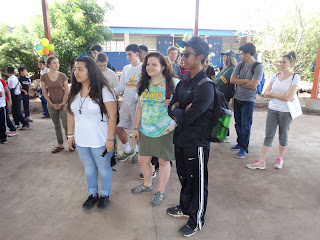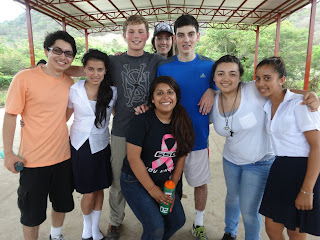This past weekend David and I had the
chance to be part of a cross-cultural exchange between high school
students. Billy Byrnes, who was a VMM volunteer in San Nicolas before
us, brought a group of American high school kids to San Nicolas for a
few days to learn about what life is like in the Nicaraguan campo.
This being quite an ambitious weekend goal, we set about packing in
the cultural experiences.
When the students arrived on Thursday,
we went to evening mass with them. They did a good job of enduring
the long service, all in Spanish, with the occasional excitement: a
stray dog bounding up to the front of the church, the congregation
singing a Spanish, religified version of Bob Dylan's “Blowin in the
Wind,” and of course the constant battle against flying ants.
On Friday the American students joined
their Nicaraguan compatriots in their three-mile walk to school. This
three miles is a daily stroll for many Nicaraguan high school
students, but most of the Americans were completely worn out by the
time they reached the paved road.
At school, we started the day with a
ceremonial ribbon-cutting for the new athletic court roof. The
mayor's office pulled out all the stops for this event, blaring
patriotic music through human-sized stereos and hanging clumps of
balloons from the court posts. After a few folkloric dances, Ruben
Dario poems, and flowery speeches, we divided the American students
into small groups and took them into the Nicaraguan classes, where we
held Q and A sessions. We had the students ask each other questions
about their various interests and high school experiences and then
played a round of English/Spanish charades.
At first the Nicaraguan students
especially were really shy about relating to the American students,
but this shyness quickly dissolved during recess when they all got
together to play soccer and basketball. By the time lunch rolled
around, they all had crushes on each other. The Americans ate lunch
with the Nicaraguan 11th grade class and the two groups
performed for each other the songs in English that they had prepared
for this occasion. This turned into an impromptu dance party that
resulted in lots of bonding and, eventually when it was time for the
Americans to leave, facebook name exchanging.
It was interesting for me to sit back
and witness all of this, and to realize the profound differences in
these kids' experiences. It was immediately obvious to me that the
American kids, even though they were on turf that was not their own,
all had so much more confidence in themselves than the Nicaraguans.
The Americans were the ones asking all the questions during the Q and
A; the Americans were also the ones who belted out their songs with
little self-consciousness. Even though most of the American students
had only taken high school Spanish classes just like the Nicaraguans
had taken high school English, the Americans were far more advanced
in their second language abilities. They were able to carry on basic
conversations in Spanish whereas our Nicaraguan students were too
embarrassed to utter even a single word in English.
But beyond all of this inequality and
difference, a beautiful bond formed nonetheless. This felt immense.
This felt like a true exchange. Both groups of students had so much
curiosity about each other. Both groups overcame the smallness of
their worlds to connect across cultural boundaries and wealth gaps,
to reach a fuller sense of the what the world is. This is the
idealist's dream.
For David and me, and for Billy too I
think, this was an amazing opportunity to share that idealist's dream
with these students. We have experienced the magic of cross-cultural
connection during our two years here, and in doing so, we have come
to cherish this community. We weren't sure if it would be possible
for this group of students to form these bonds and realize the
world-broadening power of cross-cultural exchange in a single
weekend, but I think it was possible. A day of interaction can't form
friendships that will survive the years, of course. But what I hope
will survive in all of these students, American and Nicaraguan, is an
awareness of a bigger world.



No comments:
Post a Comment